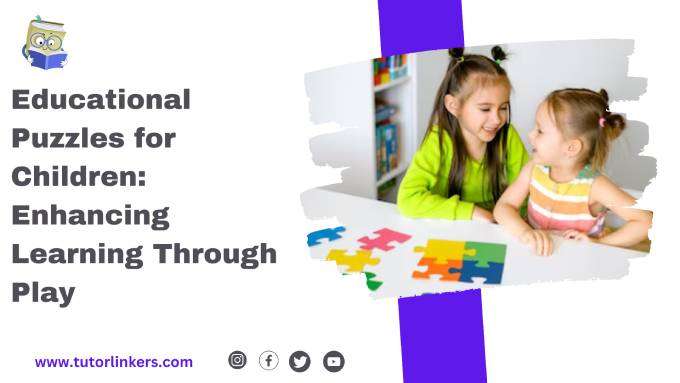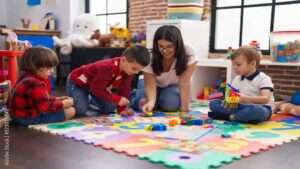Educational Puzzles for Children: In the world of childhood education, puzzles stand out as powerful tools that combine fun and learning. From jigsaw puzzles to math challenges and brain teasers, educational puzzles play a vital role in developing cognitive skills, fostering critical thinking, and reinforcing academic concepts. In this blog post, we’ll explore the diverse landscape of online educational puzzles for children, highlighting their benefits, types, age-appropriate selection, and creative ways to incorporate them into learning.
Educational puzzles are more than just entertaining pastimes—they actively engage children’s minds and promote cognitive development. Whether it’s solving a math puzzle or piecing together a jigsaw, these activities stimulate problem-solving abilities and enhance spatial awareness. Let’s dive into the world of educational puzzles and discover how they contribute to children’s growth and learning.
2. Benefits of Educational Puzzles
Educational puzzles offer a myriad of benefits that support children’s development:
| Benefits | Description |
|---|---|
| Cognitive Development | Enhances problem-solving skills, critical thinking, spatial awareness, and logical reasoning. |
| Educational Reinforcement | Reinforces academic concepts such as math, language, science, and STEM principles through interactive learning. |
| Patience and Persistence | Teaches resilience, perseverance, and the value of effort when tackling challenging puzzles. |
| Fine Motor Skills Enhancement | Improves hand-eye coordination, dexterity, and manipulation of puzzle pieces, especially in younger children. |
| Self-Esteem Boost | Boosts confidence and self-esteem when children successfully solve puzzles and achieve learning milestones. |
3. Types of Educational Puzzles
There’s a wide range of educational puzzles to choose from:
- Jigsaw Puzzles: Perfect for enhancing visual-spatial skills and attention to detail.
- Math Puzzles: Sudoku, crossword puzzles, and number mazes promote numerical fluency and pattern recognition.
- Language Puzzles: Word searches, crossword puzzles, and letter matching games improve vocabulary and language skills.
- Logic and Brain Teasers: Critical thinking puzzles, logic games, and riddles stimulate problem-solving abilities.
4. Age-Appropriate Puzzle Selection
Choosing the right puzzles is essential for engaging and challenging children appropriately:
| Age Group | Types of Puzzles |
|---|---|
| Toddlers (1-3 years) | – Large knob puzzles<br>- Shape sorters<br>- Picture puzzles |
| Preschoolers (3-5 years) | – Basic jigsaw puzzles (with large pieces)<br>- Matching games<br>- Simple number and letter puzzles |
| Early Elementary (6-8 years) | – Medium difficulty jigsaw puzzles<br>- Math puzzles (Sudoku, number mazes)<br>- Word searches and simple crosswords |
| Upper Elementary (9-11 years) | – Challenging jigsaw puzzles<br>- Advanced math puzzles (logic puzzles, fractions)<br>- More complex word puzzles and riddles |
| Middle School (12-14 years) | – Complex puzzles involving spatial reasoning and geometry<br>- STEM-themed puzzles (engineering challenges, science puzzles) |
| High School (15+ years) | – Advanced logic puzzles (cryptic crosswords, Sudoku variants)<br>- Brain teasers and critical thinking challenges<br>- Subject-specific puzzles (literature, history, etc.) |
5. Educational Goals of Puzzles
Educational puzzles serve specific learning objectives:
- Math Skills: Improve numerical fluency, logical reasoning, and understanding of mathematical concepts.
- Language Development: Enhance vocabulary, spelling, and comprehension through language-based puzzles.
- STEM Concepts: Introduce science and engineering principles through interactive STEM puzzles.
6. Benefits of Family Engagement
Involving families in puzzle-solving activities strengthens bonds and promotes collaborative learning:
- Family Game Nights: Make puzzle-solving a regular family activity to encourage teamwork and communication.
- Learning Together: Parents and siblings can participate in puzzle-solving, fostering a supportive learning environment.
7. Online Resources for Educational Puzzles
Explore reputable websites and apps that offer a wide range of educational puzzles:
| Online Resources | Description |
|---|---|
| ABCmouse | Offers a wide range of interactive puzzles and games tailored to different age groups, covering various subjects. |
| PBS Kids Games | Provides educational puzzles and activities based on popular PBS Kids shows, promoting learning through play. |
| National Geographic Kids | Features science and nature-themed puzzles, quizzes, and challenges that inspire curiosity and exploration. |
| Funbrain | Offers math and literacy games, including interactive puzzles and brain teasers suitable for elementary students. |
| CoolMath4Kids | Presents math puzzles and games designed to make learning math concepts fun and engaging for children. |
| Puzzles.com | A comprehensive puzzle resource with a variety of puzzle types, including logic puzzles, riddles, and Sudoku. |
| Highlights Kids | Offers printable and online puzzles, hidden pictures, and brain teasers for children of all ages. |
| Education.com | Provides a collection of educational puzzles and activities across different subjects and grade levels. |
8. Creating DIY Educational Puzzles
Get creative with DIY puzzle projects using everyday materials:
- Homemade Jigsaw Puzzles: Use cardboard and pictures to create personalized puzzles.
- Math Manipulatives: Create math-based puzzles using household items like buttons or blocks.
9. Educational Puzzle Tips and Strategies
Empower children with effective puzzle-solving strategies:
- Breaking Down Problems: Teach systematic approaches to tackle complex puzzles step by step.
- Encouraging Perseverance: Foster a growth mindset by emphasizing the value of effort and persistence.
10. Conclusion
Educational puzzles are invaluable assets in every child’s learning journey, offering a blend of entertainment and educational benefits. By integrating puzzles into children’s routines, parents and educators can nurture a love for learning and pave the way for academic success.
11. Call to Action
Ready to incorporate educational puzzles into your child’s learning experience? Explore a variety of puzzles and activities that cater to different ages and interests. Let’s embark on a journey of discovery and growth through educational puzzles!
Read more: Portable whiteboards for study sessions
FAQ’s
1. How do educational puzzles benefit children’s cognitive development?
Answer: Educational puzzles offer numerous cognitive benefits for children. They enhance problem-solving skills by requiring logical reasoning and spatial awareness. Puzzles also promote critical thinking, improve hand-eye coordination, and foster patience and persistence when tackling challenges. Additionally, they reinforce academic concepts in a fun and engaging way, contributing to overall cognitive development.
2. How can I select age-appropriate puzzles for my child?
Answer: When choosing puzzles for your child, consider their age, developmental stage, and interests. For toddlers and preschoolers, opt for large knob puzzles, shape sorters, and simple picture puzzles. As children grow older, introduce more complex puzzles like jigsaw puzzles, math puzzles, and word searches based on their abilities and learning goals. Always ensure that puzzles are challenging yet achievable to support skill development.
3. What precautions should I take when using online resources for educational puzzles?
Answer: While online resources offer convenient access to educational puzzles, it’s essential to prioritize safety and quality. Choose reputable websites and apps that are age-appropriate and free from inappropriate content. Monitor children’s screen time and use parental controls to ensure a safe online experience. Additionally, engage with children during puzzle activities to facilitate meaningful learning and address any questions or concerns that may arise.
Ehsan Ali is a seasoned content writer and researcher with a talent for translating complex concepts into clear, engaging content. With a deep understanding of human behavior, societal trends, and technical topics, Ehsan creates insightful and impactful content that resonates with a broad audience. His expertise ensures that each piece is both accessible and compelling, bridging the gap between intricate details and everyday understanding.





